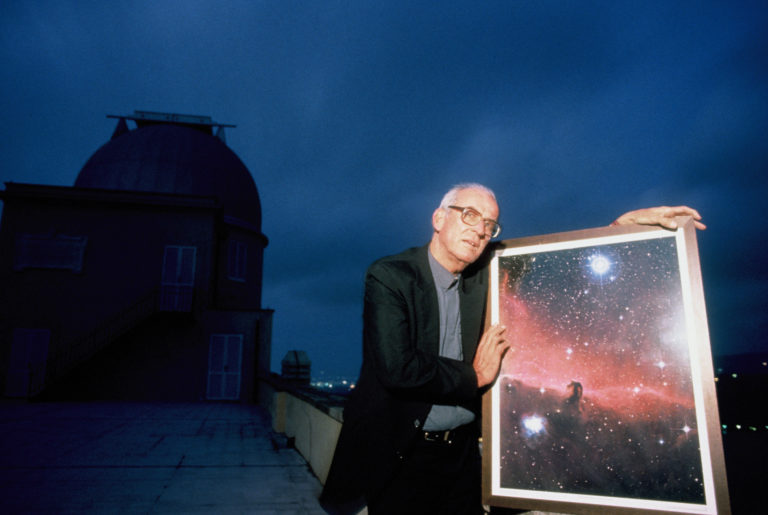
Donald Trump supporters pray as they attend a Trump rally the day after his first debate with Hillary Clinton on September 27, 2016 in Melbourne, Florida. Image by Spencer Platt/Getty Images, © All Rights Reserved.
The Will to Man: Nietzsche and American Civil Religion
Rome is not often placed in opposition to Israel. Most of the time, we speak of a linkage between Jerusalem-Athens-Rome. If we read Nietzsche’s Genealogy of Morals, we see a different picture emerge, one in which Rome and Israel are locked in perpetual conflict. In Nietzsche’s depiction, Rome glorifies man and makes him powerful, whereas Israel glorifies God and makes man subservient.
Of course, the Rome referenced in Catholic-speak is the Papal seat, whereas in Nietzsche’s writing, Rome is that militant civilization that conquered so much of the ancient world. But we would be naive to think that the two Romes can’t overlap, a reality all too easily seen in how many Catholics endorsed Trump with the hope of “winning again.”
Among Nietzsche’s many frustrations with Christianity, a signature complaint is that it places limits on natural virility: In becoming moral, man becomes weak. In the emasculated European Christian man “there is no longer anything to be feared from him…” for indeed the “vermin” man is “tame, hopelessly mediocre, and savorless.” This leads him to a general diagnosis of Europe and the malady that affects it, namely that “together with the fear of man we have also lost the love of man, reverence for man, confidence in man, indeed the will to man.” The Judeo-Christian ethic is both arbitrary and subversively cunning in a disingenuous and unnatural way.
“To expect that strength will not manifest itself as strength, as the desire to overcome, to appropriate, to have enemies, obstacles, and triumphs, is every bit as absurd as to expect that weakness will manifest itself as strength.”
Weakness must go, victory must be had, the strong must prevail, and any invented religion that would damper this natural “will to man” should be dismissed outright.
Nietzsche might have been intrigued by our President’s biblical exegesis. When asked last April about his favorite Bible verse, President Trump quoted “an eye for an eye.” His reasoning for loving this verse is remarkably congruent with Nietzsche:
“An eye for an eye… That’s not a particularly nice thing. But you know, if you look at what’s happening to our country, I mean, when you see what’s going on with our country, how people are taking advantage of us, and how they scoff at us and laugh at us… and they’re taking our jobs, they’re taking our money, they’re taking the health of our country… and we have to be firm and have to be very strong. And we can learn a lot from the Bible, that I can tell you.”
While the principle of “eye for an eye” is notable in its ancient context as a judicial constraint on retributive justice, it’s worth noting that there is nothing distinctly Christian in this espoused principle. We might ask ourselves about the nature of his “eye for an eye” civil religion.
Pulitzer Prize-winning historian Walter McDougall has been exploring this topic of Trumpian civil religion. On February 17, he gave a lecture on this very topic at the Templeton Honors College. First, he quoted at length his own reflections regarding the historical developments conditioning the current state of American voters:
“After 1945 the United States exercised a veritable hegemony over much of Eurasia, the Americas, and the oceans between. So when the Soviet Union threatened rather than joined the U.S.-led new world order, the Truman, Eisenhower, and Kennedy administrations rallied a broad consensus behind a militant ACR [American civil religion]. God called Americans to lead the Free World and rewarded them for it with unprecedented prosperity.
From the late 1940s to the early 1970s even the working classes saw their wages, security, political clout, and dignity soar to unprecedented heights. They in return formed the patriotic base who willingly paid taxes, waved flags, and gave their sons to the military. They believed their elites when they promised nothing less than a united humanity and perfect society, a New Jerusalem and heaven-on-earth sure to arrive on that glorious day the Communist bloc collapsed.
What middle-class and blue-collar Americans did not perceive was the ascent during those decades of the post-industrial financial sector to the commanding heights of the once national, now increasingly global, economy. That sector counted on free flows of capital, goods, ideas, and people across borders and thus had contempt for national sovereignty and messy democracy.”
American voters in the now infamous “working class” have been desperate, struggling to survive the overwhelming changes McDougall detailed above. And if these desperate voters were able to tolerate Trump’s crude hubris and misogyny, perhaps it was because they, Christian and non-Christian alike, have agreed too much with Nietzsche that the only good is strength. Dante is less compelling a man to us than Odysseus, and so also “Poor Jeb” and “Little Marco” less compelling than “god emperor” Trump in all his raw masculinity.
McDougall puts it this way:
“Civil religious rhetoric has traditionally been communicated through what Aristotle called enthymemes: incomplete, implied syllogisms that invite the audience to supply the missing premise and complete the argument themselves.”
In his inauguration, President Trump affirmed Christian civil religion beyond what could have been imagined, with three prayers and three benedictions (versus the customary one of each) and not shying away from explicitly invoking the Trinity and praying in Jesus’ name. As McDougall further notes,
“What made the Trump inauguration unique was the fact that he broke all the rules by allowing (encouraging?) explicit confessions of Christian faith.”
In any event, what is done is done. Trump is our president, for better or worse. It is worth being vigilant. If I’m right, and I hope I’m not, that the spirit of Nietzsche pervades the Trump administration, then we will have to guard against a complacent acceptance of surface-level Christian rhetoric, even rhetoric as explicit as what was seen in the inauguration. For if Trump is truly embracing Nietzsche, “winning” will also mean abandoning those deemed as weak or inferior and suppressing the pity that Christianity calls us to have for those who are marginalized. The will to man might succeed in achieving Roman glory for America, but if it requires us to act as Romans to the deep hurt of the most vulnerable among us, will it have been worth it?
McDougall warned us in that lecture that though “civil faith is a powerful glue that can help a large, diverse people cohere in good times and bad,” once this civil faith is “untethered from the Biblical message that even (or especially) a chosen people come under judgment when they abandon God’s commandments,” then this “civil religious solipsism based on vox populi, vox dei theology can become destructive, even suicidal.” I think that is an apt word of warning, reminding us that we must always be resistant to the “will to man” and that Rome must never become Roman, nor the City of God be conflated in our eyes with the City of Man.
The deep bond that ties together Jerusalem-Athens-Rome is one rooted not in a will to man, but rather a desire for the good that transcends man and demands his humble allegiance. What does this mean for those of us who are decidedly not on board the Trump train or who wish to jump off it? Nietzsche himself gives us the reminder of our calling, when he scoffs at Christians because they await the coming of the Kingdom of God and “live in ‘faith,’ in ‘love,’ in ‘hope.’” May this faithful, loving, and hopeful awaiting the Kingdom be the source of our strength through this season and beyond.
This essay was originally published in Ethika Politika. It is reprinted here with permission.

